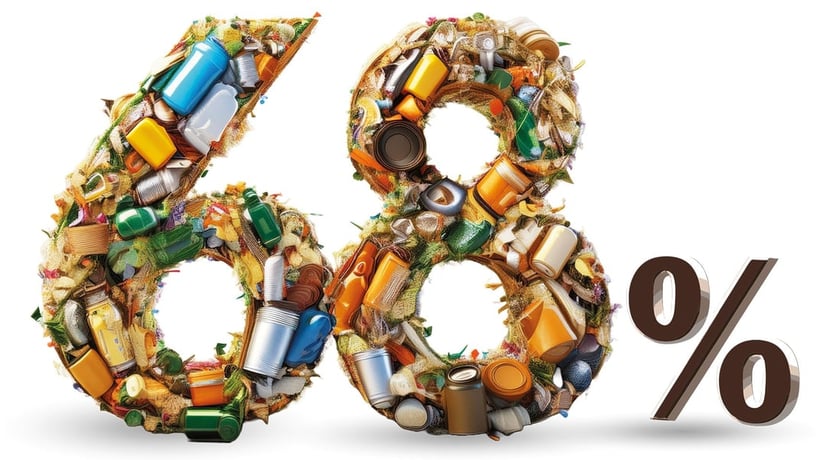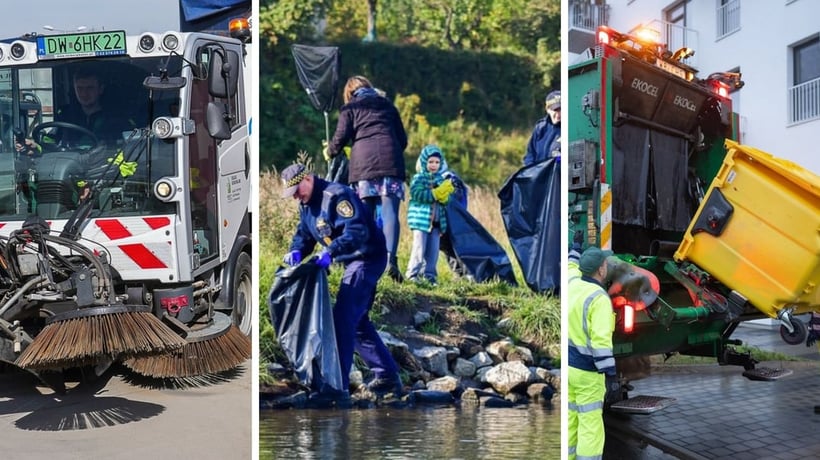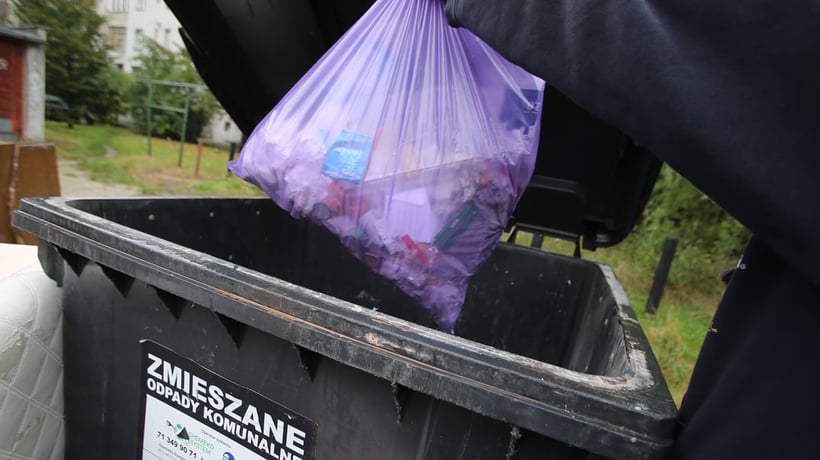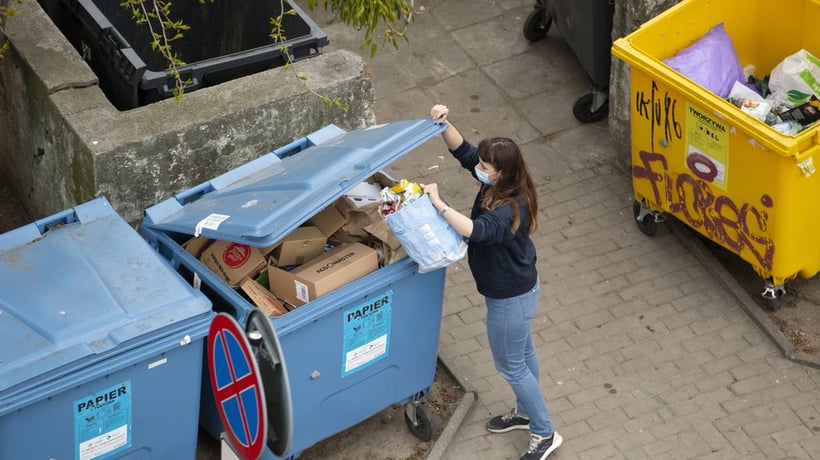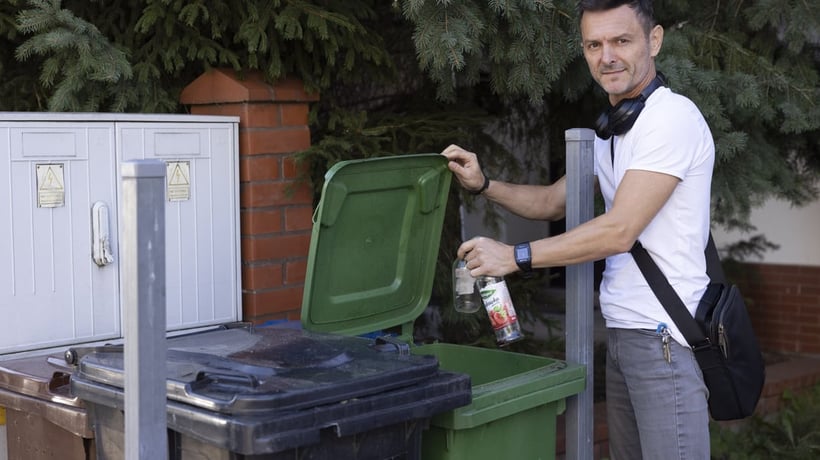WHAT DOES AN EKO-ALARM STICKER MEAN?
An EKO-Alarm sticker indicates that there is no separate waste collection at the given property. Its presence involves the following consequences:
- The waste collection company treats the waste as non-segregated (mixed) municipal waste.
- The mayor and the property owner are notified about the situation.
- Administrative proceedings may be initiated.
- A higher waste management fee may be imposed upon the property owner. In Wroclaw, the fee is PLN 82.48 per month for each person living in the property.
Legal basis: Act on Maintenance of Cleanliness and Order in Municipalities.
To avoid additional costs, remember to follow the principles of separate waste collection.
WHERE CAN I DISPOSE OF BULKY WASTE IN WROCLAW?
The PSZOK (Selective Household Waste Recycling Point) is a place where you can leave free of charge the problem waste that should not be thrown into ordinary housing estate containers.
There are two PSZOKs in Wroclaw:
- PSZOK 9 Michalczyka Street is open between 8 a.m. and 5 p.m. from Monday to Friday and between 8 a.m. and 4 p.m. on Saturdays.
- PSZOK 51 Janowska Street is open between 7 a.m. and 3 p.m. from Monday to Friday and between 7 a.m. and 3 p.m. on Saturdays.
What waste can be delivered to a PSZOK?
- Bulky waste
- Electro-waste
- Renovation and construction waste
- Tyres
- Lubricants and oils
Why use PSZOKs?
- They ensure the safe and free disposal of problem waste;
- They support the proper segregation of waste that cannot be thrown into ordinary containers;
- They contribute to environment protection through the appropriate management of difficult waste.
Who can use PSZOKs?
PSZOKs are available to all residents of the municipality. You can deliver waste by yourself.
Where can I find schedules of container placements and bulky waste collection tours?
The website of Ekosystem contains:
- Container placement schedule
- Map of container placements
- Bulky waste collection tour schedule for selected districts of Wroclaw
How can I request a bulky waste container outside the planned schedule?
Demand can be reported by: Property administrator, Property owner, Housing estate council.
Where should I report the demand? To Ekosystem.
What should be specified in the report? Container location.
What conditions must the container location meet?
It must be open to the public.
It must be convenient for easy waste collection by a waste disposal company.
Can I order a container at any time?
Yes, it is possible to request a container outside the planned schedule, but this requires notification to Ekosystem by authorised persons.
How often are schedules updated on the website of Ekosystem?
It is advisable to check the website of Ekosystem regularly, as it contains the most up-to-date information regarding container placement schedules and maps.
HOW CAN I KNOW WHEN RUBBISH IS REMOVED FROM THE PROPERTY?
Where can I find the waste collection schedule?
The current waste collection schedule is available on the website of Ekosystem.
How to check waste collection days for a particular property?
For single-family houses:
In the schedules tab, you can generate an individual waste collection schedule.
For multi-apartment buildings:
Enter the street name in the appropriate box.
The system will display waste collection days for the location.
How to use the schedule check tool?
Visit the website of Ekosystem
Find the tab dedicated to schedules
Select the option appropriate for the type of property (single-family or multi-apartment)
Follow the instructions on the website
Is the schedule updated regularly?
Yes, there is always an up-to-date waste collection schedule on the website of Ekosystem.
WHAT IS A RUBBISH DECLARATION AND WHO HAS TO SUBMIT IT?
The declaration regarding the amount of the municipal waste management fee (commonly called 'rubbish declaration') is a document that every property owner has to submit. It includes information on:
- The number of persons living in the property
- The amount of the waste management fee
Who submits the declaration?
- Owners of single-family houses – individually
- For multi-apartment buildings – the property administrator
- Owners of vacant or mixed properties should also specify the number and capacity of waste containers and the frequency of their emptying
What are the requirements for waste containers?
The amounts stated in the declaration cannot be smaller than those set out in the Rules of Maintenance of Cleanliness and Order in Wroclaw. Overfilling of containers should be prevented.
Where should I submit the declaration?
The declaration has to be submitted to the Department of Taxes and Fees of the Wroclaw City Office.
Where can I find more information?
Detailed information is available in the Public Information Bulletin.
WHERE TO REPORT A SHORTAGE OF CONTAINERS IN WROCLAW?
Who can report the need to change the number of waste containers?
The need to increase or decrease the number of waste containers is notified by the property administrator.
How is the number of containers for one property determined?
The number of containers is determined on the basis of:
Provisions of the Rules of Maintenance of Cleanliness and Order in Wroclaw
The rule that there must be no overfilling of containers
What are the criteria for determining the number of containers?
Provisions contained in the Rules of Maintenance of Cleanliness and Order in Wroclaw
Actual demand for containers at the given property
The need to avoid the overfilling of containers
What can be done if containers are frequently overfilled?
If there are regular overfills, the property administrator should report the need for more containers.
Can the number of containers be reduced?
Yes, if the current number of containers is too high in relation to the needs, the manager can report the need to reduce their number.
WHY IS THE MULTIPLE WASTE DISPOSAL FEE CHARGED?
The multiple waste disposal fee (or increased fee) is charged for failure to segregate waste. This is due to the following reasons:
Legal obligation: - The Act on Maintenance of Cleanliness and Order in Municipalities (Article 6ka(3)) mandates that an increased fee must be charged in the event of failure to comply with the segregation obligation.
Higher costs for the municipality: - The management of unsegregated (mixed) waste is more expensive than the processing of sorted waste. - The increased fee compensates for these additional costs.
Treatment of waste: - According to Article 6ka(1) of the Act, non-segregated waste is accepted as mixed waste, which involves higher processing costs.
Nature of the fee: - The increased fee is treated as a fee for an additional mixed waste management service.
Confirmation in the case law: - The judgment of the Supreme Administrative Court of 19th May 2022 (ref. no. III FSK 14/22) confirms the legitimacy of charging such a fee.
To sum up, the multiple fee is charged to compensate the municipality for the higher costs of processing of non-segregated waste and to encourage residents to segregate waste correctly.
IS SEGREGATION COMPULSORY?
Selective waste collection is compulsory and Wroclaw, like other municipalities and communes in Poland, is obliged to reach strict recycling levels set by the EU. The required level was 35% in 2023; it will be 45% in 2024 and will rise to 55% in 2025. The waste that ends up in the black bin instead of being sorted is virtually unrecoverable.
‘We cannot assume that someone will sort our rubbish for us. Recovering raw materials from mixed waste is very difficult. It is a complex, time-consuming and costly process,’ says Aleksandra Palus, spokesperson for Ekosystem. ‘You can easily imagine this on the example of paper. The cardboard packaging that ends up in mixed waste soaks up liquids, becomes soiled and greasy and, therefore, cannot be recycled,’ he adds.
IS RUBBISH COLLECTED BY ONE DUMP TRUCK?
The myth of rubbish mixing in the rubbish truck is one of the most frequently repeated harmful information about waste collection in every city in Poland:). It is worth realising that waste in Wroclaw is currently collected by single-compartment dump trucks – this is economical and makes it possible to plan long routes during which dump trucks (weighing over 26 tonnes) collect plenty of waste without having to return to the base. Each rubbish truck is marked with a magnetic board with the name of the fraction it is collecting on that day.’
IS IT NECESSARY TO WASH CONTAINERS BEFORE DISPOSAL?
No. The containers need to be emptied of any leftover food, but they do not have to be washed. Recyclers wash them in a closed water cycle. This is more economical and environmentally friendly than washing them at home.
Who is responsible for what?
Who is responsible for tidying up around rubbish bins? Everyone has a role in this process. The housing estate may be the most beautiful, but so what if the bin shed looks scary with waste lying around the bins, broken glass or an old chest of drawers in the bushes. Keeping the rubbish bin area tidy requires awareness of who is responsible for what and civic-mindedness on the part of residents.
Who is responsible for what?
The property administrator:
identifies and prepares a Waste Collection Site (WCS)
adjusts the number of containers to the number of residents;
maintains the WCS and the area within 1.5 m away from it in a suitable condition;
keeps the WCS clean by cleaning up debris outside the containers at least once a week;
wash and disinfect the WCS if its surface makes this possible at least once every six months.
So if you notice a mess around a bin shed, do not hesitate to call or email the administrator of the premises or the housing co-operative. This also applies to bulky items next to the rubbish bin. Your administrator can apply to Ekosystem for a container to be placed. You can also intervene if the bins are overfilled, as this means that their number is underestimated.
The waste collection company:
collects waste according to a schedule;
washes and disinfects municipal waste containers at least once every six months;
takes care of the technical condition of the containers.
If you think that the company does not collect your waste on time, please report this via Interactive Resident Service Centre to Ekosystem (contact.ecosystem.wroc.pl), which supervises waste collection in Wroclaw. There are times when the contractor cannot deliver a service because this is not technically possible. The most common reasons for this are densely parked cars or bulky waste taken out in an inappropriate way that prevent the rubbish truck from reaching the shed.
In the case of detached houses, the owner has to put the waste container in front of their property.
Ekosystem:
supervises the work of waste collection companies;
accepts reports of collection irregularities;
restores order when, for example, a plastic bin has toppled over and the bags are hanging on the surrounding bushes.
So if you notice that the mess has moved further than the prescribed 1.5 m from the shed (this area is the responsibility of the administrator), please inform Ekosystem via Interactive Citizen Service Centre at www.ekosystem.wroc.pl.
Residents:
their task is to dispose of waste into containers and bags in accordance with the principles of separate collection: plastics, paper and cardboard, bio-waste, glass, mixed waste;
it is also the responsibility of residents to report problems such as overfilled buckets or the lack of a bucket for the relevant fraction to their administrator or Ekosystem.
ATTENTION! If the waste collection company notices that the waste is not segregated or is placed in the wrong containers, it will stick an Eko Alarm label on our bucket. It means that all rubbish in the container will go into mixed waste and an extra fee may be charged for the collection.
HOW OFTEN IS RUBBISH COLLECTED IN WROCLAW?
According to the Resolution on the Rules of Maintenance of Cleanliness and Order in the City of Wroclaw, waste in the city is collected with a minimum frequency of: at least once a week for mixed waste and bio-waste. For metal, plastic and paper waste – at least every fortnight. For glass waste – at least once a month. These are minimum collection frequencies, but the contracts between the contractors and Ekosystem contain the provisions on their increase in order to avoid overfilling. As a result, waste is collected far more frequently in Wroclaw.


